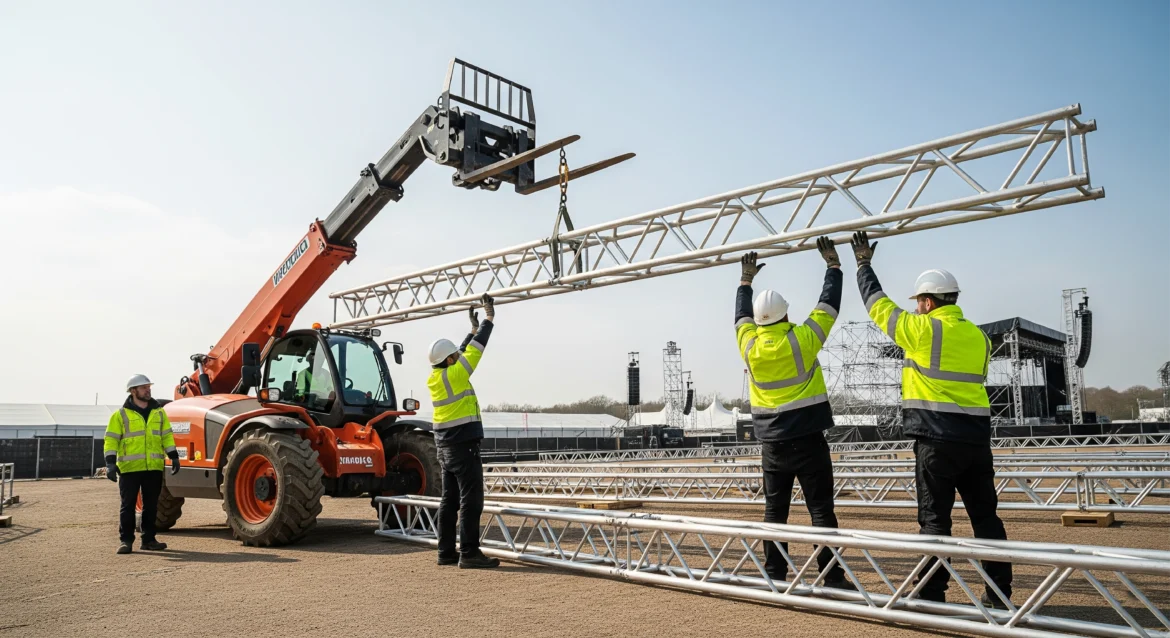Plant and machinery play a vital role in setting up and running events across the UK. From tele-handlers and forklifts used to unload equipment, to mobile elevated work platforms (MEWPs) for rigging and lighting, plant makes it possible to build temporary event infrastructure efficiently and safely.
But plant also comes with risks. Misuse, poor planning, or unqualified operators can cause accidents with serious consequences — not just for workers, but also for contractors, performers, and the public. This is why using plant at events must be carefully managed, with clear roles, responsibilities, and competent, certified drivers.
Relevant UK Legislation
Several key pieces of UK health and safety law apply to the use of plant at events:
- Health and Safety at Work etc. Act 1974 – requires employers and organisers to ensure the safety of employees and others affected by work.
- Provision and Use of Work Equipment Regulations 1998 (PUWER) – requires plant and equipment to be suitable, maintained, and operated by trained individuals.
- Lifting Operations and Lifting Equipment Regulations 1998 (LOLER) – applies to lifting operations, requiring proper planning, safe systems of work, and competent operators.
- Work at Height Regulations 2005 – relevant when using MEWPs or any plant that involves work above ground level.
These regulations make it clear: competence, planning, and safe operation are legal requirements, not optional extras.
Roles and Responsibilities
The safe use of plant at events depends on collaboration between multiple duty-holders:
Event Organiser / Venue Manager
- Ensure risk assessments include plant and machinery operations.
- Appoint competent contractors and plant hire companies.
- Enforce site rules for plant movement (e.g. speed limits, exclusion zones).
Plant Hire Company
- Supply plant that is fit for purpose and properly maintained.
- Provide inspection and maintenance records.
- Confirm that only trained, authorised operators are permitted to use the equipment.
Plant Operators
- Must hold valid certification and be competent to operate the specific type of plant (e.g. forklift vs. tele-handler vs. MEWP).
- Carry out daily pre-use checks on equipment.
- Operate machinery in line with training, manufacturer instructions, and site safety rules.
Supervisors / Site Managers
- Plan lifting operations and ensure safe systems of work.
- Enforce exclusion zones and banks-man requirements where necessary.
- Monitor operators and intervene if unsafe practices occur.
The Importance of Certification
Plant operators must be properly trained and certified to operate the specific type of plant they are using. Certification demonstrates competence, knowledge of hazards, and ability to work safely.
Common training schemes include:
- CPCS (Construction Plant Competence Scheme)
- NPORS (National Plant Operators Registration Scheme)
- IPAF (International Powered Access Federation) – for MEWPs.
Certificates should be in-date and verifiable. Event organisers have the right — and duty — to request evidence before allowing plant operations on site.
Planning and Safe Use of Plant
Beyond operator competence, plant use must be planned and controlled:
- Risk Assessments and Method Statements (RAMS) should cover plant movement, lifting operations, and potential hazards.
- Exclusion zones should be clearly marked to protect pedestrians.
- Load calculations and Safe Working Load (SWL) limits must never be exceeded.
- Banks-men or spotters should be used for reversing or complex movements.
- Regular inspections should ensure equipment remains in safe condition throughout the event build and breakdown.
Why Certification and Control Matter
Uncertified or careless use of plant can result in:
- Crushing injuries or fatalities.
- Damage to staging, temporary structures, or venue infrastructure.
- Prosecution for breaches of health and safety law.
- Event delays, insurance claims, and reputational damage.
Conversely, ensuring operators are properly certified and equipment is used safely:
- Protects workers, contractors, and the public.
- Demonstrates legal compliance with PUWER, LOLER, and HSWA.
- Reduces downtime, damage, and costs.
- Gives organisers and stakeholders confidence in the professionalism of the event team.
Final Thoughts
Plant and machinery are indispensable at events, but they bring significant risks that must be managed. Certified operators, competent supervision, and clear responsibilities are essential to prevent accidents and keep projects running smoothly.
Event organisers and contractors should never allow uncertified plant drivers on site. The law demands competence, and the moral duty to protect people demands nothing less.
